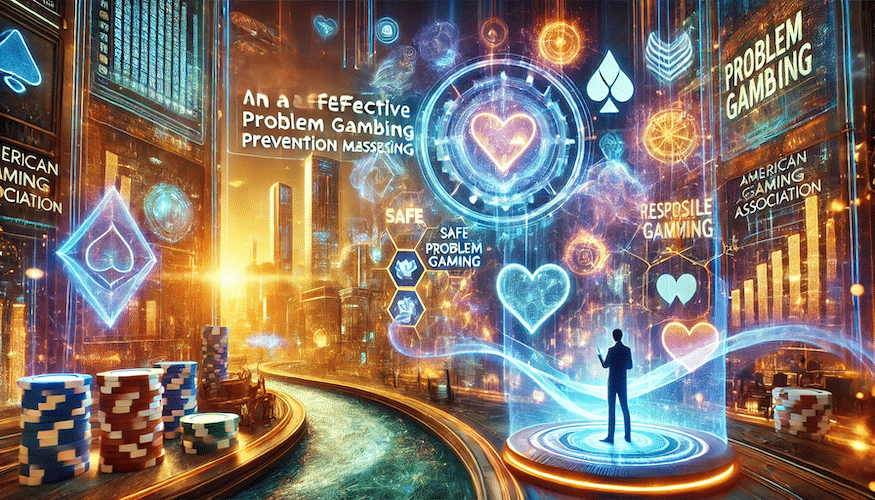In an important step towards improving responsible gambling messaging, the American Gaming Association (AGA) has unveiled the Responsible Gaming Intervention Effectiveness Scale (RG-IES). This innovative tool is the result of collaboration between AGA, prominent gaming companies like Bally’s, BetMGM, and FanDuel, along with researchers Drs. Jonathan Ross Gilbert and Marla Stafford. The goal of RG-IES is to evaluate how effective responsible gaming messages are, particularly in preventing problem gambling behaviors.
This September, join the American Gaming Association and our members as we highlight the industry’s responsible gaming education efforts. Together, we can promote gaming literacy and consumer education, elevate employee training, and work with partners to advance our understanding of responsible gambling.
Empowering Stakeholders with Better RG Campaigns
The RG-IES tool, released in conjunction with Responsible Gambling Education Month in September, is designed to assist various industry stakeholders—including casinos and sportsbooks—by helping them craft more memorable and impactful responsible gambling (RG) messages. A key distinction of RG-IES is that it encourages campaigns to adopt a more positive and interactive approach rather than relying on the typical clinical and traditional strategies. This shift aims to make RG messages more engaging and relatable to players, moving away from the often dry tone used in the past.
An AGA statement expressed the hope that the RG-IES would spark further research on tailoring gambling-related communications in a way that resonates more effectively with players. By providing this tool, the association seeks to inspire stakeholders to develop creative and responsible messaging that makes a real impact on reducing problem gambling.
Clarifying Responsible Gaming vs. Problem Gambling
One of the essential aspects of RG-IES is its ability to distinguish between responsible gaming and problem gambling. Responsible gaming is about enjoying the activity of gambling while minimizing any potential harm, such as financial difficulties or psychological stress. On the other hand, problem gambling is generally fueled by the pursuit of profit, where users are more likely to engage in riskier behaviors, often extending play sessions to recover lost money.
To assess the quality of a responsible gambling message, users of the RG-IES tool are asked to rate messages or advertisements against 15 pre-set statements. These statements gauge whether the message promotes responsible behavior, highlights the availability of tools for responsible play, and encourages betting limits. Ratings are based on a 1-7 scale, with scores below the 4.0 average indicating that the message may need revisions to be more effective.
AGA’s Commitment to a Balanced Industry
The AGA has reiterated its dedication to fostering a balanced gaming industry, one that supports both fun and safety. While RG-IES is not a catch-all solution, the AGA believes it will become a vital tool for operators, academics, and policymakers working to refine responsible gambling messaging. The scale will assist in determining whether a particular message has the potential to resonate with the public and achieve its intended goal.
The AGA noted in a statement, also expressing gratitude to the researchers behind the project, that this new scale is very important for evaluating the effectiveness of messages to the public.
This new scale is an important starting point in evaluating whether or not a message has the potential to resonate with the public.
Shifting Perceptions of Gaming
Recent studies conducted by the AGA show a growing acceptance of casino gaming and sports betting as legitimate forms of entertainment among U.S. citizens. As part of Responsible Gambling Education Month, the AGA aims to raise further awareness about the value of responsible gaming programs, reinforcing its commitment to maintaining a safe and sustainable gaming environment.
At the heart of the AGA’s mission is the belief that responsible play is a core principle for the gaming industry in the United States. However, the organization has also voiced its concerns over excessive regulation. Instead, the AGA advocates for a balanced approach that offers sufficient consumer protection while allowing gaming operators the flexibility to expand their businesses, which, in turn, strengthens the broader economy.
In conclusion, the introduction of the RG-IES marks an important milestone in the gaming industry’s efforts to promote responsible gambling. By encouraging stakeholders to create more engaging and effective responsible gambling messages, the AGA continues to lead the charge in ensuring that gaming remains a safe and enjoyable activity for all.
Over in Europe
Recently, we reported that the European Gaming and Betting Association (EGBA) released its 2024 Sustainability Report in July, showing a significant rise in the use of responsible gambling tools across Europe. A key highlight was the fact that 65% of European customers now use safer gambling features to manage their gambling habits, with 21 million customers adopting these tools, half of whom did so voluntarily. Deposit limits remain the most popular tool, with 70% of voluntary users opting for this feature.
The report also showed an increase in personalized safety messages sent by EGBA member operators, with 67.6 million messages delivered, a 49% rise from the previous year. Of these, 23 million messages were personalized, helping customers manage their gambling behaviors more effectively. Additionally, the report highlighted training efforts, with 80% of EGBA members’ employees receiving specialized training in safer gambling practices, leading to improved or stabilized gambling behaviors in 65% of potentially problematic customers.


